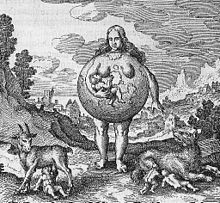
The word "nature" comes from the Latin word, "natura", meaning birth or character (see nature (philosophy)). In English, its first recorded use (in the sense of the entirety of the phenomena of the world) was in 1266. "Natura" and the personification of Mother Nature were widely popular in the Middle Ages. As a concept, seated between the properly divine and the human, it can be traced to Ancient Greece, though Earth (or "Eorthe" in the Old English period) may have been personified as a goddess. The Norse also had a goddess called Jord (or Erth).
The earliest written usage is in Mycenaean Greek: Ma-ka (transliterated as ma-ga), "Mother Gaia", written in Linear B syllabic script (13th or 12th century BC).[1] In Greece, the pre-Socratic philosophers had "invented" nature when they abstracted the entirety of phenomena of the world as singular: physis, and this was inherited by Aristotle. Later medieval Christian thinkers did not see nature as inclusive of everything, but thought that she had been created by God; her place lay on earth, below the unchanging heavens and moon. Nature lay somewhere in the center, with agents above her (angels), and below her (demons and hell). For the medieval mind she was only a personification, not a goddess.
Greek myth

In Greek mythology, Persephone, daughter of Demeter (goddess of the harvest), was abducted by Hades (god of the dead), and taken to the underworld as his queen. Demeter was so distraught that no crops would grow and the "entire human race [would] have perished of cruel, biting hunger if Zeus had not been concerned" (Larousse 152). Zeus forced Hades to return Persephone to her mother, but while in the underworld, Persephone had eaten pomegranate seeds, the food of the dead and thus, she must spend part of each year with Hades in the underworld. Demeter's grief for her daughter in the realm of the dead, is reflected in the barren winter months and her joy when Persephone returns is reflected in the bountiful summer months
Demeter would take the place of her grandmother, Gaia, and her mother, Rhea, as goddess of the earth in a time when humans and gods thought the activities of the heavens more sacred than those of earth.[2]
Ancient Rome
Roman Epicurean poet Lucretius opens his didactic poem De rerum naturaby addressing Venus as a veritable mother of nature.[3] Lucretius uses Venus as "a personified symbol for the generative aspect of nature".[4] This largely has to do with the nature of Lucretius' work, which presents a nontheistic understanding of the world that eschews superstition










